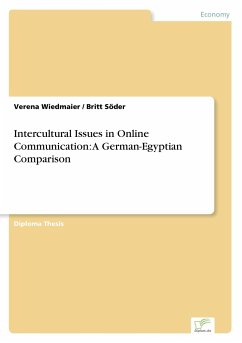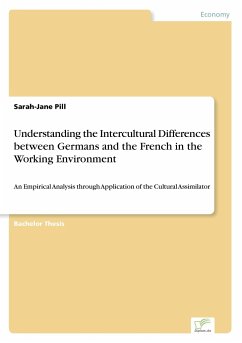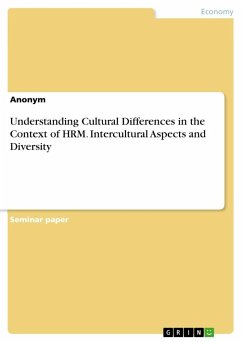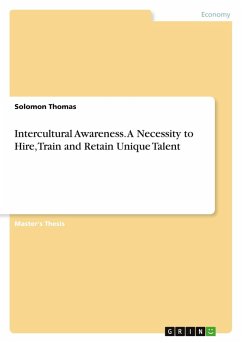Diploma Thesis from the year 2006 in the subject Business economics - Trade and Distribution, grade: 1,3, Heilbronn University (Wirtschaft), language: English, abstract: Inhaltsangabe:Abstract:
In these times of rapid increase of internet usage, the question arises for multinational companies (MNCs) whether to standardise or adapt their internet presence to different cultural groupings or even subcultures.
The overall target of this research is therefore to assist MNCs by producing recommendations concerning the promotion of products and services for a particular transnational consumer group. Therefore, country-specific websites of companies rooted in different cultural origins are selected for this research, namely EgyptAir, Mercedes-Benz and SonyEricsson.
This analysis follows the inductive research approach embedding elements of an ethnographic and exploratory research method. The main part of the empirical study is conducted by means of an online-behaviourist questionnaire following the quantitative research approach and complementary a culture-related questionnaire following the qualitative research approach.
The sample size is composed of Egyptian students from the Misr International University in Cairo and German students from Heilbronn University forming the selected samples. Even though Egypt is a developing country and Germany an industrialised one, the samples are comparable due to the similar social and educational backgrounds.
The research results are applied to the lifestyle typology segmentation method, namely the Euro-Social-Styles of the GfK thus creating a new model of six lifestyle typologies in which the two samples are categorised.
It is revealed by the main findings that the respective companies deal despite the different nationalities of the samples, with a transnational consumer group which is characterised by a relative homogeneity. Nevertheless, not all values and traits are similar within this consumer group and it therefore requires a certain degree of adaptation of marketing activities.
It was possible to identify within the scope of this research that, in general, companies enjoying a high brand awareness and reputation are not exposed to the urge of adaptation, especially when selling culture-free products and services.
Finally, one should continuously bear in mind that generalisations must not be made at any stage. Moreover, due to the small sample size, this research only represents a starting point for further research.
Inhaltsverzeichnis:Table of Contents:
1.INTRODUCTION3
1.1Background of the Thesis3
1.2Objectives and Roadmap of the Thesis4
2.METHODOLOGY7
2.1The Inductive Approach7
2.2Ethnographic Approach9
2.3Research Approach: Exploratory Approach10
3.REVIEW OF LITERATURE11
3.1Culture: Egypt as an Exemplification11
3.1.1Definition of the Term Culture11
3.1.2Selective Aspects of the Egyptian Culture12
3.2Determinants of International Marketing19
3.2.1Socio-cultural Factors21
3.2.2Globalisation Approach - the Convergence Thesis23
3.2.3Adaptation Need - the Divergence Approach23
3.2.4Approach of the Typology of Lifestyles26
4.EMPIRICAL STUDY29
4.1Research Method29
4.2Procedure of Interrogation30
4.2.1German Students: E-mail administered method31
4.2.2Egyptian Students: Hybrid Interrogation Method36
4.3Preparation of Questionnaires37
4.3.1Axiom38
4.3.2Quantitative and Qualitative Research Approach38
4.3.3Choice of Questionnaire Format41
4.4Websites as Part of Online Communication66
4.4.1Fundamentals of a Company Website67
4.4.2The Websites of this Survey70
5.EVALUATION AND INTERPRETATION OF RESEARCH RESULTS81
5.1Rate of Return81
5.2Evaluation of the Online-behaviourist Questionnaire82
5.3Evaluation of the Culture-related Questionn...
Hinweis: Dieser Artikel kann nur an eine deutsche Lieferadresse ausgeliefert werden.
In these times of rapid increase of internet usage, the question arises for multinational companies (MNCs) whether to standardise or adapt their internet presence to different cultural groupings or even subcultures.
The overall target of this research is therefore to assist MNCs by producing recommendations concerning the promotion of products and services for a particular transnational consumer group. Therefore, country-specific websites of companies rooted in different cultural origins are selected for this research, namely EgyptAir, Mercedes-Benz and SonyEricsson.
This analysis follows the inductive research approach embedding elements of an ethnographic and exploratory research method. The main part of the empirical study is conducted by means of an online-behaviourist questionnaire following the quantitative research approach and complementary a culture-related questionnaire following the qualitative research approach.
The sample size is composed of Egyptian students from the Misr International University in Cairo and German students from Heilbronn University forming the selected samples. Even though Egypt is a developing country and Germany an industrialised one, the samples are comparable due to the similar social and educational backgrounds.
The research results are applied to the lifestyle typology segmentation method, namely the Euro-Social-Styles of the GfK thus creating a new model of six lifestyle typologies in which the two samples are categorised.
It is revealed by the main findings that the respective companies deal despite the different nationalities of the samples, with a transnational consumer group which is characterised by a relative homogeneity. Nevertheless, not all values and traits are similar within this consumer group and it therefore requires a certain degree of adaptation of marketing activities.
It was possible to identify within the scope of this research that, in general, companies enjoying a high brand awareness and reputation are not exposed to the urge of adaptation, especially when selling culture-free products and services.
Finally, one should continuously bear in mind that generalisations must not be made at any stage. Moreover, due to the small sample size, this research only represents a starting point for further research.
Inhaltsverzeichnis:Table of Contents:
1.INTRODUCTION3
1.1Background of the Thesis3
1.2Objectives and Roadmap of the Thesis4
2.METHODOLOGY7
2.1The Inductive Approach7
2.2Ethnographic Approach9
2.3Research Approach: Exploratory Approach10
3.REVIEW OF LITERATURE11
3.1Culture: Egypt as an Exemplification11
3.1.1Definition of the Term Culture11
3.1.2Selective Aspects of the Egyptian Culture12
3.2Determinants of International Marketing19
3.2.1Socio-cultural Factors21
3.2.2Globalisation Approach - the Convergence Thesis23
3.2.3Adaptation Need - the Divergence Approach23
3.2.4Approach of the Typology of Lifestyles26
4.EMPIRICAL STUDY29
4.1Research Method29
4.2Procedure of Interrogation30
4.2.1German Students: E-mail administered method31
4.2.2Egyptian Students: Hybrid Interrogation Method36
4.3Preparation of Questionnaires37
4.3.1Axiom38
4.3.2Quantitative and Qualitative Research Approach38
4.3.3Choice of Questionnaire Format41
4.4Websites as Part of Online Communication66
4.4.1Fundamentals of a Company Website67
4.4.2The Websites of this Survey70
5.EVALUATION AND INTERPRETATION OF RESEARCH RESULTS81
5.1Rate of Return81
5.2Evaluation of the Online-behaviourist Questionnaire82
5.3Evaluation of the Culture-related Questionn...
Hinweis: Dieser Artikel kann nur an eine deutsche Lieferadresse ausgeliefert werden.








